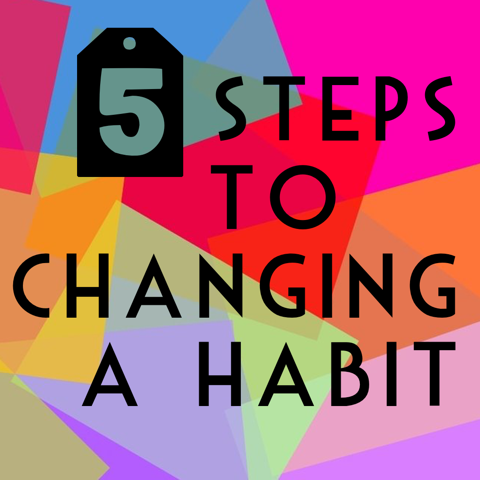Warning: Forming any new habit is a long process and not an easy one either. Before we can form anything new, we need to purge the old.
Moving on beyond those old habits can be extremely challenging because we don’t always take the time to a) look at them and b) they’re ingrained in us.
NUMBER ONE
Do not attempt to change more than one habit at a time. One is plenty. If you try to take on too many changes at once, you risk failing at all of them. Which does not put you in the best place.
NUMBER TWO
As I mentioned earlier, your current habits are engrained in you. When we get rid of something, we have to replace it with something else of equal value. So, let’s say you’re a smoker who wants to quit. You’re not going to want to fill that void with eating because that’s not a healthy habit either. So, we need to take an unhealthy habit and turn it into something healthy. Maybe instead of eating in place of a cigarette, you do jumping jacks instead. We don’t take something as significant as smoking with keeping your desk clean; those are not equal.
NUMBER THREE
Keep in mind: Habits are MEANT to be broken. They don’t necessarily have a positive tone to them. You don’t need to complicate it more by obsessing or over-analyzing. What we want to be able to do is say, “I’m going to change this,” and commit to doing so.
NUMBER FOUR
Set up a support system. Even if it’s just one person, it could be a friend, a coach, or a family member. Make sure it’s someone you trust and can be completely honest with. Expect good and bad days. And there are times where you’ll need to take one minute at a time.
NUMBER FIVE
Be understanding and kind with yourself. It takes at least 30 days to form a new habit. In those 30 days, be your own champion. Utilize your support network. Don’t let a slip up get you down; they’re going to happen. We need to learn and grow from those experiences.
Putting It Into Practice
Now that we understand what it may look like to form a new habit, what it feels like, and understand you need a support network when looking at developing better habits…
1. Start each day with a purpose: Wake up and know what you want to accomplish. This is another opportunity to be kind to yourself. It’s not required to have a list of twenty things. The next question is, how do I define my purpose? I am in control, so I will be making those decisions.
2. Organization: If you are an avid reader of my blog, you will see this word in practically every article. If your space is organized, your brain is organized. If you don’t have a mess around you, there are no distractions for reaching for those accomplishments. When I get to my office in the morning and see a pile on my desk, I immediately get upset that I did not give myself a good start to the day. I had a client not too long ago who never brushed his teeth (no judgment). This was a complicated task for him. One of the first things we did was make sure his bathroom was clean and organized. Then we had him go out and get himself a new toothbrush and toothpaste. So, besides his job, the only purpose for his day was to make sure he’d wake up in the morning and brush his teeth and brush them again before he went to sleep at night. It works. Without the extra distractions around him, he could take control of this habit he wanted to form.
3. Know the why: Why do you want to form this habit? Why is it important to you? Once this habit is formed, how do you imagine it will help you in life? Back to the client with the tooth brushing issue, for him, it was one small thing he could do to feel like a responsible adult. In his mind, that’s what adults do. Keeping that in mind, knowing the importance of feeling that way, he was 100% committed to bettering himself through this newly formed habit of his. The why is just as important as the action.
4. Support: We already discussed having a support network earlier in this article. And, here is the reason why it’s so important. When growing or changing, it can be scary. Yes, there will be roadblocks. Yes, sometimes it’s one step forward, three steps back. With having somebody you trust and respect, they’re on the journey with you. You have your own personal cheerleader, someone who maybe you check in with every time you brush your teeth in the morning and night. Coaches are utilized for that level of accountability. If you call or check-in and say I didn’t do X this morning, there won’t be any judgment from a coach. But, there will be questions.
Wrapping It Up
If it were not possible to create new habits and make positive changes in our lives, there would be no reason for my job. It’s possible! You have to want it.

